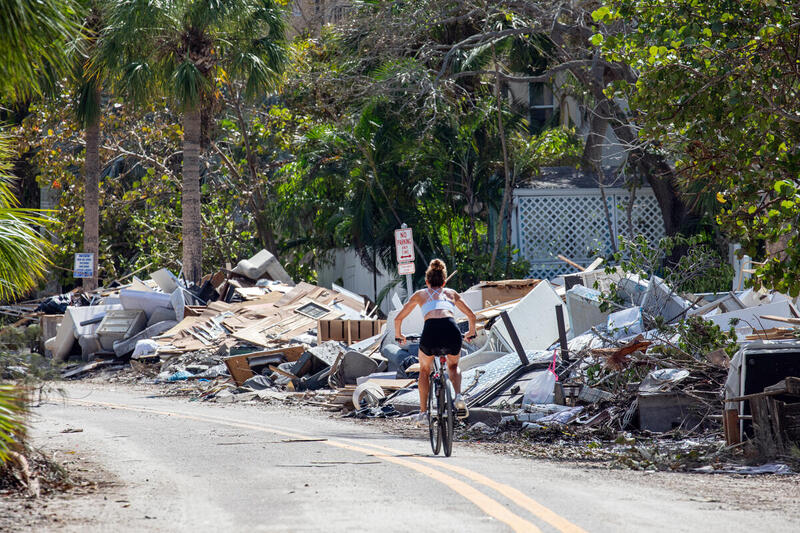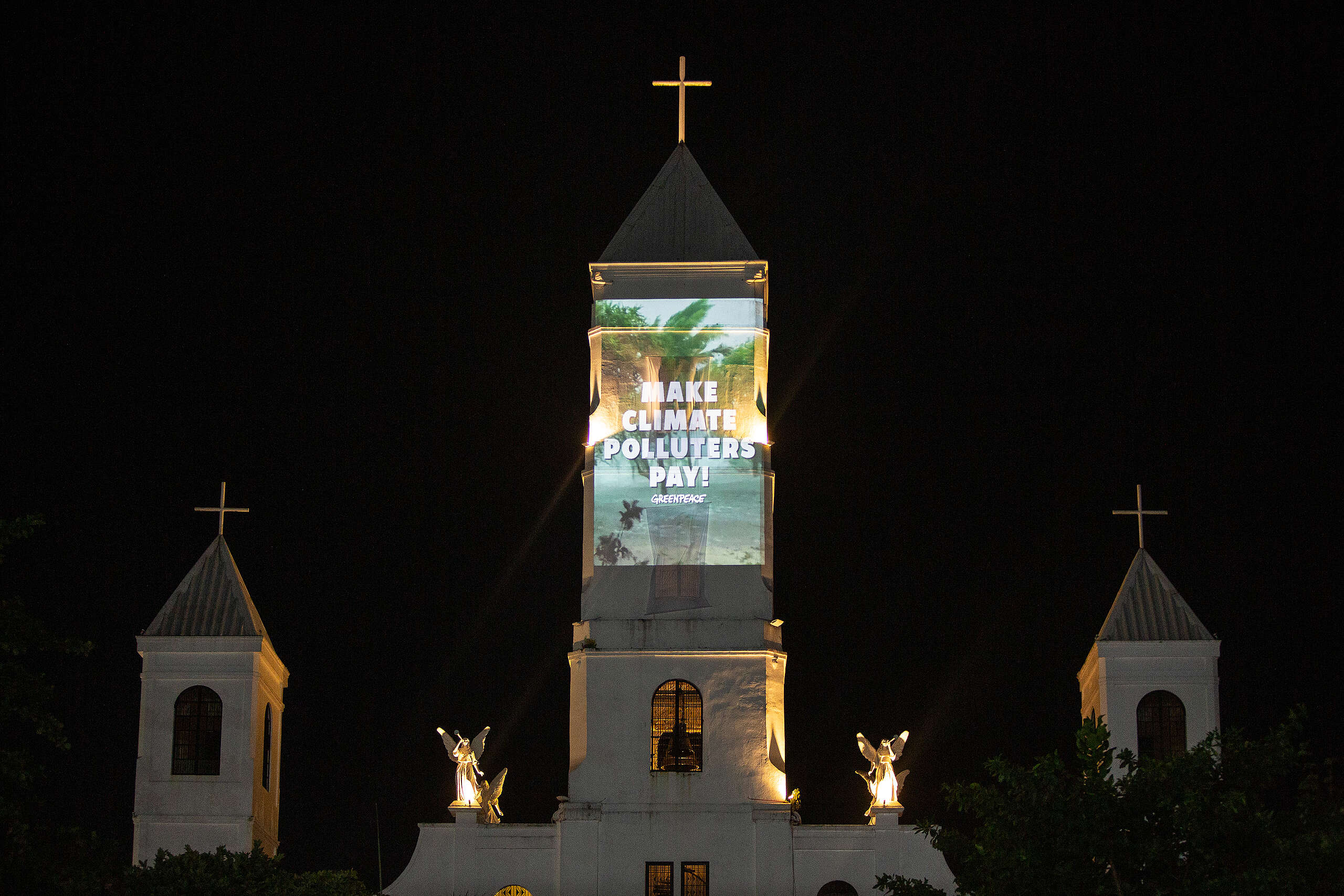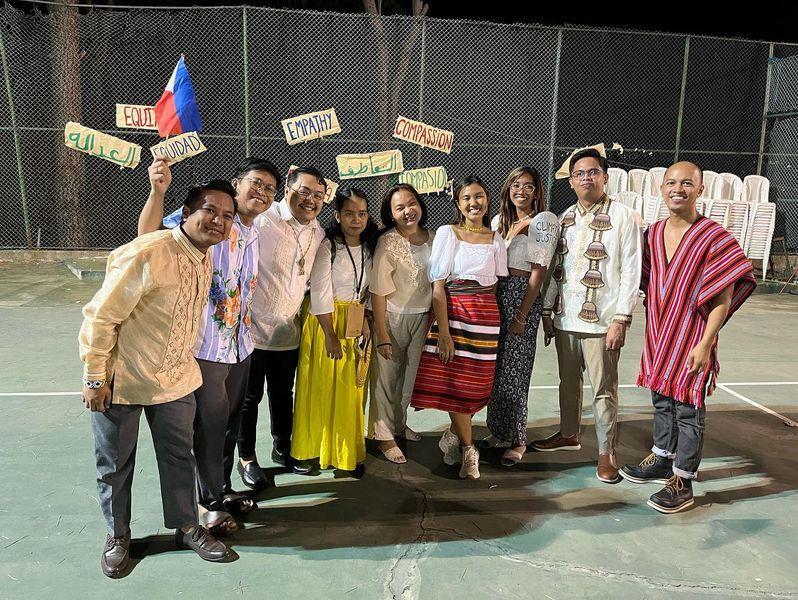Tubigon, BOHOL, Philippines (13 November 2023) – Representatives of climate-impacted communities, civil society organizations, and local government units of Bohol province gathered to put forward a “Climate Justice People’s Agenda,” in a summit held in the municipality of Tubigon, Bohol. The agenda consolidates the demands and concrete actions from various stakeholders to address various climate impacts experienced by Bohol communities, and the need for accountability from those most responsible for the climate crisis.
The Climate Justice Summit took place as the Greenpeace ship Rainbow Warrior anchored in Cebu Strait near Bohol, to bear witness to island and coastal communities’ experiences of climate change—from slow-onset impacts such as current and imminent sea level rise, to extreme weather events such as more intense typhoons.
Funding for adaptation measures and post-typhoon recovery has been irregular at best, and as climate impacts continue to get worse, communities’ demand for justice from oil, coal and gas companies most responsible for climate change is also growing. “I hope they stop destroying our environment. They must pay for the suffering that we in small islands are experiencing. They must pay us for their irresponsible actions,” said Annie Casquejo, a resident of Batasan Island, Tubigon.
Civil society organizations that have worked closely with local communities believe that accountability and reparations for climate loss and damage are needed to scale up local solutions and help communities respond more adequately to the current climate reality. A recent OneEarth report found that the world’s top fossil fuel companies owe a total of USD 99 trillion (PHP 5.032 quadrillion) in climate loss and damage to compensate communities most affected by the crisis.[1]
Among the solutions eyed to build Bohol province’s adaptive capacity and increase its climate resilience is utilizing renewable energy. A recent report by the Center for Renewable Energy and Sustainable Technology (CREST) highlights how increasing the renewable energy share in Bohol’s energy mix can enhance the province’s capacity to adapt and mitigate disaster impacts.
Greenpeace states that ongoing international climate discussions and the upcoming United Nations Climate Change Conference of Parties (COP28) should put climate-impacted and vulnerable communities’ urgent needs front and center.
###
Note:
[1] Time to pay the piper: Fossil fuel companies’ reparations for climate damages
Photos can be accessed here. Please credit photos to Geric Cruz/Greenpeace
Media Contact:
Karl Orit, Communications Campaigner for Greenpeace Philippines
M: +639194571064 E: [email protected]
QUOTES:
Tubigon Mayor William Jao
“The Local Government Unit (LGU) of Tubigon is in line with the preservation and conservation of our environment, as many of our fellow Tubignons depend on fishing for their livelihood. Our actions have an impact on living things. We need to give justice to our environment.”
Bohol Governor Erico Aristotle Aumentado
“Here in Bohol, we have felt the effects of a changing climate. Super Typhoon Odette in 2021 caused so much havoc that it left behind a trail of tragedy and devastation in many communities, especially in the northern parts of Bohol. There is no future without climate justice. This is the time for us to show the world what we, Boholanos and Filipinos, can do for the planet.”
Rep. Edgar M. Chatto, 1st District of Bohol
“This summit signifies our mutual desire to mitigate climate impacts, especially in climate crisis-prone countries. We join the communities in calling for loss and damage (finance) inasmuch as Bohol is one of the frontline communities in climate impacts as we experience extreme weather events.”
Khevin Yu, Greenpeace Campaigner
“As climate impacts are escalating every year, the choices for many of these communities are becoming more limited. In particular, communities living with sea level rise are left to choose between relocating to higher ground and taking provisional adaptation measures for as long as they can. They should not have to make such impossible choices while fossil fuel corporations continue to worsen the climate crisis.
The harsh and unpredictable impacts of climate change render the futures of communities in even greater peril, pushing people’s resources and coping capacity beyond their limits. Global climate negotiations in COP28 should not only heed community voices, but they must urgently support them by instituting loss and damage mechanisms that put human rights at the center, grounded in the principle of making polluters pay.”
Ms. Hazel Tanchuling, Rice Watch Action (R1) Network Executive Director
“A resolute demand for loss and damage financing could go a long way to improve the capacities of local communities to implement mitigation and adaptation measures. Some of these funds may be used to: set up community-based early warning systems; draft development plans that incorporate the transition from dirty to renewable energy, greater food and nutrition security and social protection initiatives for small- to medium-scale food producers; build safely-managed water and sanitation facilities and services; establish alternative livelihoods and enterprises; and carry out an effective solid waste management policy and program.”
Reference: Bohol Climate Emergency Response Roadmap 2021-2030
Rei Panaligan, CREST President
“More than half of Bohol’s electricity needs are sourced from power plants located outside of the island province. Unfortunately, heavy reliance on imported power puts the local economy in a place that’s more susceptible to climate change. It took months before electricity was completely restored in the province after Typhoon Odette destroyed vast transmission and distribution electricity grid infrastructures. Bohol has abundant renewable resources such as solar and wind. Promoting more investments to enhance indigenous power production will boost Bohol’s energy sector for it to become more resilient against climate change impacts.”




Discussion
#safe-fair-future
#safe-fair-future
#safe-fair-future
#safe-fair-future